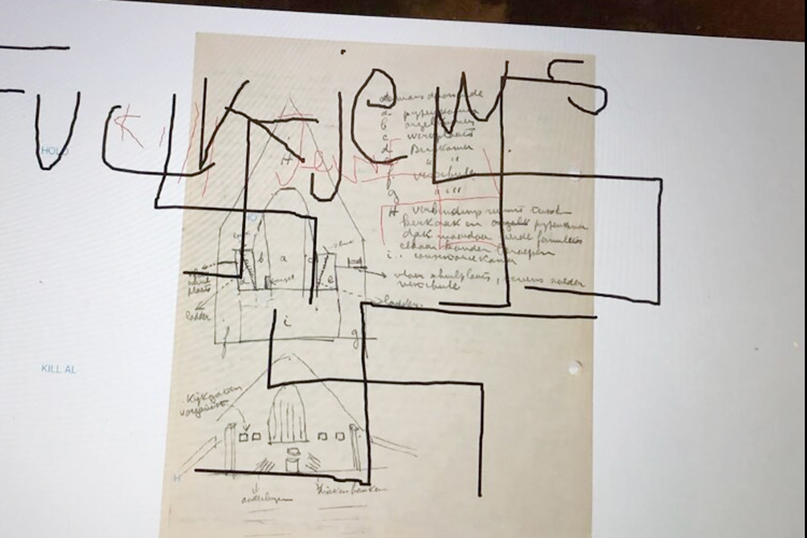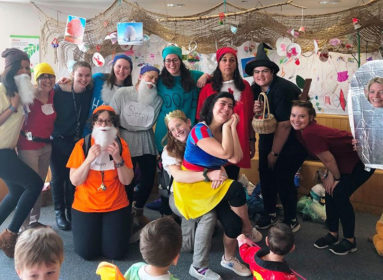
By Stacey Dresner
FARMINGTON – At an August 11 event hosted by Voices of Hope author/educator Daphne Geismar was discussing Invisible Years: Opening the Holocaust Drawers, her book about her family’s experiences in the Netherlands during the Holocaust, when the program was Zoombombed with antisemitic drawings of swastikas and comments denying the Holocaust.
Based in Farmington, Voices of Hope is a non-profit organization created by descendants of Holocaust survivors from across Connecticut to educate the community about the Holocaust through events like book discussions, films, educator workshops and school speaking engagements.
Hacking into the organization’s meeting with hateful messages has only inspired the organization to continue its work, the group said in a statement released following the incident.
“These anti-Semites want us to talk about the hate crimes they committed,” the statement read. “Instead we will talk about how we continued our program, how Daphne Geismar went on to share her family’s history and share with us a glimpse into the art and education that is her book. These bigots were so angry at our good work that they wanted to stop us. We did not stop. We will not stop.”
When Geismar presented sketches from her grandfather’s Holocaust journal, the hackers were able to draw swastikas on the screen for all of the participants to see. Reportedly, during Geismar’s presentation, a participant stated that they were “second-generation Holocaust survivors.” A voice answered, “Ha ha, the Holocaust never happened.”
“Holocaust denial is one of the antisemite’s favorite tool to use so it’s not surprising they would stoop so low as to do it at a Holocaust themed book event, Liora Rez, executive director of StopAntisemitism.org, told the Ledger. “Through large calls to action on alternative dark sites such as 4chan and 8chan, they seek out Zoom meetings to spew their vile bigotry.
The incident was reported to the Farmington Police Department, the Connecticut office of the FBI and the Anti-Defamation League.
“We are still actively investigating,” said Lt. Tim McKenzie of the
Farmington Police Department. “It is taking time with subpoenas and search warrants sent to Zoom and Zoom sending us the information back. We don’t have any suspects at this time. It’s going to take a little longer but it is an active investigation.”
McKenzie added that the West Hartford Police Department is assisting in the investigation.
The Voices of Hope Zoombombing is one of several similar incidents that have targeted Jewish organizations in Connecticut, and one of many that have become a problem for Jewish organizations around the country.
“Zoom claims they have stepped up their security. However, since March, we’ve been seeing incidents like this happen week after week. And thanks to the world of VPN’s, those involved are very difficult to track.” (A VPN is a virtual private network. It extends a private network across a public network and enables users to send and receive data across shared or public networks as if their computing devices were directly connected to the private network.)
Since the Covid quarantine began in March and meetings and events have gone virtual, the incidence of disruptive, hateful or offensive Zoombombings. According to Zoom, the number of daily Zoom meetings grew from 10 million late last year, to more than 200 million this spring when the quarantine began.
“We’ve seen many zoom bombings nationally,” Andy Friedland, associate director of the Connecticut office of the Anti-Defamation League, told the Ledger. “As more and more [people] move online, the people who are hateful, who seek to harass, who seek to be offensive, move online as well.
In July, a Friday evening Zoom Shabbat service at Temple Sinai in Newington was hacked by someone who drew swastikas over the text of the Kaddish prayer, made inappropriate comments via the chat box and used a stereotypical caricature of a Jew in one of the Zoom window screens.
On May 11, a Talmud class taught online by Rabbi Shlomo Yaffe of Congregation B’nai Torah in Longmeadow, Massachusetts was Zoombombed with pornographic drawings.
Both Temple Sinai and B’nai Torah have since protected their Zoom meetings with, among other things, passwords for Zoom participants and by not posting virtual meetings publicly.
After the B’nai Torah incident, Robert Trestan, executive director of the Boston office of the ADL cautioned that, “in the same way we now take security measures in the physical sense, we now need to be taking the same measures in the virtual sense. A religious institution needs to be protecting its religious services virtually, the same way that they protect their physical building.”
Because many people are new to Zoom and may not be aware of ways to be safe and keep hackers out of their Zoom meetings, the ADL has worked with Zoom to “create new security features and settings so that people’s meetings will be safer,” Friedland said. “We’ve created a lot of resources, along the lines of, what you can do to prevent Zoombombings; what you can do when a Zoombombing is happening to get all of the information you need to get; how to talk to you kids about it. We have been looking at it holistically to see how we can stop these things from happening, but if they do happen, how to respond.”
The ADL website features several links with resources related to Zoom security issues, including how to prevent Zoombombing; updates on Zoom security; and steps to take during a Zoombombing. (See links below).
In their statement, Voices of Hope says they have already improved security in advance of future virtual events.
“These crimes proved how much work we have left to do…This experience will accelerate our efforts, and we will work harder than ever before to create a culture of courage to stand up against hatred.”
Stop the Bomb
The Anti-Defamation League has worked hard to respond to and stop zoombombing. They compiled a list of resources to help the community understand and deal with this growing problem:
How to Prevent Zoombombing: https://www.adl.org/blog/how-to-prevent-zoombombing
What is Zoombombing and Who is Behind it? https://www.adl.org/blog/what-is-zoombombing-and-who-is-behind-it
Steps to Take During a Zoombombing Incident: https://www.adl.org/blog/steps-to-take-during-a-zoombombing-incident
Webinar ADL hosted on Zoombombing: https://youtu.be/T_SPYXrrNP8
Zoom security updates that help fight Zoombombing: https://www.adl.org/blog/zoom-security-update-provides-tools-to-fight-zoombombing
Table talk on Hate Symbols: https://www.adl.org/education/resources/tools-and-strategies/table-talk/hate-symbols
Table talk on responding to online hate: https://www.adl.org/education/resources/tools-and-strategies/table-talk/cyberhate
Main Photo: When author Daphne Geismar presented sketches from her grandfather’s Holocaust journal, hackers drew swastikas on the screen and a voice told the group of second-generation survivors, “Ha ha, the Holocaust never happened.” (Credit: StopAntisemitism.org)








 Southern New England Jewish Ledger
Southern New England Jewish Ledger














